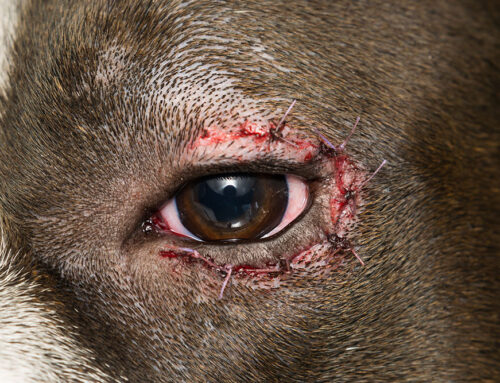From incessant itching to visible rashes, skin disorders in pets are all too common. Understanding these ailments is crucial to maintaining your furry pal’s well-being and quality of life. Our Wales Animal Clinic team explores some common skin conditions affecting pets, shedding light on their causes, treatment, and preventive measures.
Skin problems in pets
Skin problems are one of the most common reasons cats and dogs are brought to see their veterinarian. The following are some of the skin disorders that affect our furry friends:
- Flea allergy dermatitis (FAD) — Fleas are not just pesky pests; they also transmit several diseases and can trigger severe allergic reactions in some pets. FAD results from hypersensitivity to flea saliva that comes into contact with a pet through a bite. Pets suffering from FAD may experience intense itching, hair loss, and skin irritation. Effective flea control through topical treatments, oral medications, and environmental management is essential to managing FAD and preventing prevalent flea-borne diseases.
- Atopic dermatitis — Similar to human eczema, atopic dermatitis in pets appears as inflamed, itchy skin. Allergens from pollen, dust mites, and molds often trigger this condition. Signs of atopic dermatitis include scratching, licking, and recurrent ear infections. Treatment involves allergen avoidance, medicated baths, antihistamines, and immunotherapy in severe cases.
- Hot spots (acute moist dermatitis) — Hot spots are localized areas of skin inflammation and bacterial infection caused by excessive licking, scratching, or moisture. Sometimes, pet owners confuse these spots with insect bites. Common triggers include flea infestations, allergies, and skin irritations. Treatment involves shaving and cleaning the affected area, applying topical medications, and addressing the underlying cause to prevent recurrence.
- Ringworm (Dermatophytosis) — Although the name might suggest it, ringworm isn’t caused by worms but by a fungal infection. It appears as circular, bald patches with scaly skin and may be accompanied by itching, hair loss, and scaling or dry patches of skin. Ringworm is contagious among pets and people, so use gloves when applying medication to your pet and quarantine them from children and other pets until they are ringworm-free. Treatment includes antifungal medications, topical creams, and environmental decontamination.
- Ear infections (Otitis externa) — Ear infections are prevalent in pets, particularly those with floppy ears or excessive hair in the ear canal. Signs of infection include head shaking, scratching at the ears, odor, and discharge. Treatment involves cleaning the ears, administering topical or systemic antibiotics, and addressing underlying factors such as allergies or ear mites. You should also clean your pet’s ears once a month with a pet-formulated ear cleaner to promote better ear health and prevent infections.
- Seborrhea — Seborrhea is a skin disorder characterized by excessive oiliness (seborrhea oleosa) or dry, flaky skin (seborrhea sicca). Some breeds predisposed to seborrhea include basset hounds, cocker spaniels, and West Highland white terriers. Treatment focuses on medicated shampoos, dietary supplements, and management of any underlying conditions.
Preventing common skin problems in cats and dogs

Many skin disorders result from parasites, fungal infections, allergies, and inadequate grooming. You can help keep your four-legged friend’s skin in excellent health by:
- Regularly inspecting your pet’s skin for redness, rashes, bumps, fleas, or other problems.
- Bathing your pet regularly with a gentle, pet-formulated shampoo. Daily brushing can remove loose or matted fur and distribute skin oils that keep the skin and coat healthy.
- Drying your pet’s skin and fur thoroughly after bathing or after they’ve been in the water.
- Trimming your pet’s ears, focusing on hairs that are close to the ear canal, and cleaning the ears with a specially formulated pet ear solution.
- Keeping your pet on their flea and tick preventives.
- Feeding your pet a nutritious diet and possibly adding omega-3 fish oils to their food to promote healthy skin. First, however, check with your veterinarian for the correct amount to use.
- Maintaining your pet’s regular wellness exams, during which your veterinarian will inspect their skin and assess their overall physical health.
Skin conditions can significantly affect your pet’s quality of life, causing them discomfort and affecting their overall health. Early recognition, prompt treatment, and preventive measures are essential in managing these ailments and keeping your furry kin healthy and happy.
Is your pet itchy and scratchy? We can help. Contact the Wales Animal Clinic team for an examination.







Leave A Comment